European countries split over use of medical-grade face masks
Germany and Austria mandate use of expensive FFP2 masks while WHO backs fabric coverings

A free daily email with the biggest news stories of the day – and the best features from TheWeek.com
You are now subscribed
Your newsletter sign-up was successful
The debate over face masks to protect against Covid has taken a new twist as some European nations make medical-grade masks compulsory while the World Health Organization (WHO) continues to support the use of fabric versions.
The German state of Bavaria and Austria have “tightened rules” to mandate that FFP2 masks must be worn inside shops and on public transport, Politico reports. And France has “recommended against wearing some homemade masks that don’t meet certain standards”.
“But many other European countries, as well as the WHO, are sticking to their current advice,” the news site adds.
The Week
Escape your echo chamber. Get the facts behind the news, plus analysis from multiple perspectives.

Sign up for The Week's Free Newsletters
From our morning news briefing to a weekly Good News Newsletter, get the best of The Week delivered directly to your inbox.
From our morning news briefing to a weekly Good News Newsletter, get the best of The Week delivered directly to your inbox.
The UN health agency’s technical lead for Covid-19, Maria Van Kerkhove, insists that “limited and inconsistent scientific evidence” on masks in community settings is grounds to retain the existing guidance, rather than recommending higher-grade masks.
Explaining the difference between the various kinds of face coverings, Lawrence Young, professor of molecular oncology at Warwick Medical School, said that while “fabric masks, or blue and white surgical masks, stop you breathing out infectious virus onto other people”, FFP2 masks are designed to “protect the wearer from breathing in infectious virus shed in aerosols from infected individuals”.
However, Dr Simon Kolstoe, a senior lecturer in evidence-based healthcare at the University of Portsmouth, told Euronews that although FFP2 masks are used in hospitals and laboratories, it would be “unreasonable” to expect them to be as effective when used by members of the public who lack the “training” that health professionals will have received.
“Anyone who’s worked in those sorts of environments knows that it’s not just a case of slapping a mask on,” Kolstoe said. “There’s training as well, wearing gloves, wearing the right equipment, washing your hands, an appropriate way of handling things.”
A free daily email with the biggest news stories of the day – and the best features from TheWeek.com
Chas Newkey-Burden has been part of The Week Digital team for more than a decade and a journalist for 25 years, starting out on the irreverent football weekly 90 Minutes, before moving to lifestyle magazines Loaded and Attitude. He was a columnist for The Big Issue and landed a world exclusive with David Beckham that became the weekly magazine’s bestselling issue. He now writes regularly for The Guardian, The Telegraph, The Independent, Metro, FourFourTwo and the i new site. He is also the author of a number of non-fiction books.
-
 The environmental cost of GLP-1s
The environmental cost of GLP-1sThe explainer Producing the drugs is a dirty process
-
 Greenland’s capital becomes ground zero for the country’s diplomatic straits
Greenland’s capital becomes ground zero for the country’s diplomatic straitsIN THE SPOTLIGHT A flurry of new consular activity in Nuuk shows how important Greenland has become to Europeans’ anxiety about American imperialism
-
 ‘This is something that happens all too often’
‘This is something that happens all too often’Instant Opinion Opinion, comment and editorials of the day
-
 A Nipah virus outbreak in India has brought back Covid-era surveillance
A Nipah virus outbreak in India has brought back Covid-era surveillanceUnder the radar The disease can spread through animals and humans
-
 Covid-19 mRNA vaccines could help fight cancer
Covid-19 mRNA vaccines could help fight cancerUnder the radar They boost the immune system
-
 The new Stratus Covid strain – and why it’s on the rise
The new Stratus Covid strain – and why it’s on the riseThe Explainer ‘No evidence’ new variant is more dangerous or that vaccines won’t work against it, say UK health experts
-
 RFK Jr. vaccine panel advises restricting MMRV shot
RFK Jr. vaccine panel advises restricting MMRV shotSpeed Read The committee voted to restrict access to a childhood vaccine against chickenpox
-
 RFK Jr. scraps Covid shots for pregnant women, kids
RFK Jr. scraps Covid shots for pregnant women, kidsSpeed Read The Health Secretary announced a policy change without informing CDC officials
-
 New FDA chiefs limit Covid-19 shots to elderly, sick
New FDA chiefs limit Covid-19 shots to elderly, sickspeed read The FDA set stricter approval standards for booster shots
-
 RFK Jr.: A new plan for sabotaging vaccines
RFK Jr.: A new plan for sabotaging vaccinesFeature The Health Secretary announced changes to vaccine testing and asks Americans to 'do your own research'
-
 Five years on: How Covid changed everything
Five years on: How Covid changed everythingFeature We seem to have collectively forgotten Covid’s horrors, but they have completely reshaped politics